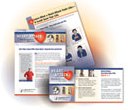Who Is at Risk for a Heart Attack?
Certain risk factors make it more likely that you'll develop coronary heart disease (CHD) and have a heart attack. You can control many of these risk factors.
Risk Factors You Can Control
The major risk factors for a heart attack that you can control include:
- Smoking
- High blood pressure
- High blood cholesterol
- Overweight and obesity
- An unhealthy diet (for example, a diet high in saturated fat, trans fat, cholesterol, and sodium)
- Lack of routine physical activity
- High blood sugar due to insulin resistance or diabetes
Some of these risk factors—such as obesity, high blood pressure, and high blood sugar—tend to occur together. When they do, it's called metabolic syndrome.
In general, a person who has metabolic syndrome is twice as likely to develop heart disease and five times as likely to develop diabetes as someone who doesn't have metabolic syndrome.
For more information about the risk factors that are part of metabolic syndrome, go to the Health Topics Metabolic Syndrome article.
Risk Factors You Can't Control
Risk factors that you can't control include:
- Age. The risk of heart disease increases for men after age 45 and for women after age 55 (or after menopause).
- Family history of early heart disease. Your risk increases if your father or a brother was diagnosed with heart disease before 55 years of age, or if your mother or a sister was diagnosed with heart disease before 65 years of age.
- Preeclampsia (pre-e-KLAMP-se-ah). This condition can develop during pregnancy. The two main signs of preeclampsia are a rise in blood pressure and excess protein in the urine. Preeclampsia is linked to an increased lifetime risk of heart disease, including CHD, heart attack, heart failure, and high blood pressure.
Featured Video
The NHLBI "Grand Opportunity" Exome Sequencing Project
-
 Heart Attack Warning Symptoms
Heart Attack Warning Symptoms
10/20/2011
Have questions about heart disease in women? Join The Heart Truth®, Million Hearts™, the American College of Cardiology, and Healthfinder.gov for a World Heart Day Twitter chat on September 28, at 1 p.m. eastern time. Learn more about the history of women’s heart disease research and ask live experts your questions. Go to www.twitter.com, and search for #HeartChat to join the chat.
Clinical trials are research studies that explore whether a medical strategy, treatment, or device is safe and effective for humans. To find clinical trials that are currently underway for Heart Attack, visit www.clinicaltrials.gov.
September 4, 2012
Silent heart attacks are common and predict risk of death, MRI diagnosis shows
Magnetic resonance imaging (MRI) is more effective than electrocardiography (ECG) at identifying "silent" heart attacks, also known as unrecognized myocardial infarctions, according to a study performed by National Institutes of Health researchers and international colleagues.

When a heart attack happens, any delays in treatment can be deadly.
Knowing the warning symptoms of a heart attack and how to take action can save your life or someone else’s.
The NHLBI has created a new series of informative, easy-to-read heart attack materials to help the public better understand the facts about heart attacks and how to act fast to save a life.
Click the links to download or order the NHLBI's new heart attack materials:
“Don’t Take a Chance With a Heart Attack: Know the Facts and Act Fast” (also available in Spanish)
“Heart Attack: Know the Symptoms. Take Action.”
“Learn What a Heart Attack Feels Like—It Could Save Your Life”
The NHLBI updates Health Topics articles on a biennial cycle based on a thorough review of research findings and new literature. The articles also are updated as needed if important new research is published. The date on each Health Topics article reflects when the content was originally posted or last revised.

















 The NHLBI "Grand Opportunity" Exome Sequencing Project
The NHLBI "Grand Opportunity" Exome Sequencing Project